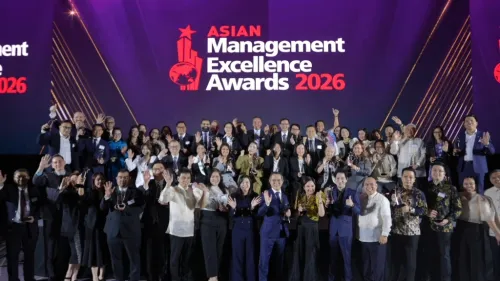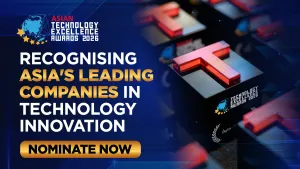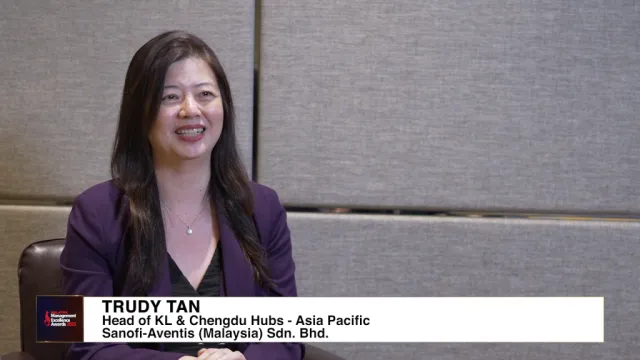
Grant Thornton’s Glen Thomas believes the Middle East is on the fast track to being a global technology leader
Education, collaboration are keys to the adoption of robotic automation, mobile banking, sustainability solutions.
Glen Thomas is the Cyber and Technology (CyberTech) Practice Partner at Grant Thornton UAE, where he leads in delivering technology transformation, information security/cyber and risk projects for government, energy, telco and finance sectors.
In his more than 20-years career, Thomas successfully delivered cyber and security-focused strategic leadership, information, technology and security risk management, threat intelligence, cyber investigations, e-discovery and biometrics projects. He has worked with standards and regulatory bodies to develop policies aligned with resource management and deliver transformation projects in the Asia Pacific, US, UK, EU, and the Middle East and broader MENA region. In addition, he gained entrepreneurial experience by founding no less than three startups.
Before joining Grant Thornton, he led the cyber practice at one of the Big Four firms in Saudi Arabia.
In his role as a judge in the Middle East Technology Excellence Awards, Thomas spoke with the Asian Business Review about how the Middle East is navigating its position as a technology and business leader, the region’s adoption of leading-edge solutions, and the most rewarding part about working with regional clients.
What are the upcoming tech trends that you can see Middle Eastern businesses benefit from the most?
The Middle East is not that different from the rest of the world when we are looking at technology trends. There are arguably more mature markets that have a more programmatic or practised approach to technology adoption. Over the past 4-5 years, however, there has been a demonstrable accelerated growth in the adoption of technology in the Middle East. This growth has been undeniably exponentially impacted by COVID-19.
The drivers in the Middle East for these initiatives and thirst for the adoption of technology can be attributed, in part, to the shift from dependence on traditional forms of revenue. But there is also a fascination and drive to become regional and world leaders in all things tech and there is significant support from government and investors to achieve this goal. I recently provided a three-day session to one of the largest regulators in the region and their focus is on Fintech, RegTech and Cryptocurrencies and how they are impacting the financial market. However, there is also a strong focus on technology such as Blockchain, Cloud Services, Automation, Data Protection, Smart Cities and Cybersecurity.
Specific trends as I see them in the region include:
- Blockchain adoption across various sectors, not just in Finance.
- FinTech/RegTech/Crypto-currencies – I will bucket these together as I see them as somewhat synergistic. There has been a growth in the region in Digital Exchanges, Crypto wallets, and similar providers as well as regulators implementing sandbox environments for these providers to build their tech.
- Robotic Process Automation (RPA) – automation is being looked at as a way to become more agile and reduce time and overheads in production.
- Mobile and Open banking initiatives – The financial services sector is looking at cloud migration with an eye to the introduction of Azure and AWS data centres in the region to address data offshoring concerns.
- Digital Twins – particularly in energy and construction.
- Cybersecurity – The region is one of the most targeted globally and a strong Cyber focus is held by all governments in the region.
- Environmental, Social and Governance (ESG) Technology and initiatives – strong growth and interest sector in the region that will continue to drive innovation and resulting tech to manage and report using technologies such as blockchain.
- Fog computing – probably the ‘blue sky’ trend in the region given only recently has there been large data centres like Azure in place but certainly, a trend that is not far from being realised.
What is your advice to businesses in the region when it comes to keeping abreast with the latest technological solutions?
Education and collaboration. There are many informed sources online or on social media platforms as well as other mediums globally. My advice is to first understand what your business does, what the trends in the market are that may impact your business (think Blockbuster and Netflix, Uber etc.) and how you can not only keep track of those trends but adopt those that will ensure you remain relevant in the market.
However, I also caution them not to adopt a technology solely to be seen as a first-mover or because it is a ‘trend’. Reaching for bright shiny things to implement may result in your focus being shifted and wasting time and money implementing a technology that isn’t relevant to your business.
How has the pandemic affected the tech industry in the region?
Before the COVID-19 pandemic had such a profound impact on global affairs – health, business, and social interaction – the adoption of technology was driven predominantly by the need to adapt to meet the innovation ecosystem, changing economic climate and cultural and generational shifts. It could be argued that the paradigm shift after each of these major events or series of events led to a ‘new norm’ incorporating elements of the traditional approach to doing business with new adaptations.
The COVID-19 pandemic has demonstrated that decisive, agile, and forward-thinking governments have been the most successful when it comes to managing the immediate response and roadmap out of the crisis. For global and local economies to thrive, these traits need to be adopted by businesses – including the Tech industry.
The tech sector in the Middle East certainly has been impacted by the pandemic. Some for the good, others not so much. There are many accelerators, hubs, and other platforms for the tech industry to thrive in the region and as mentioned before, there is strong backing at the government level as well as large corporates in the region to adopt the technology. Consequently, the market remains and, in some instances, has thrived as we have had to adapt to the changing work environment and contactless society that has been driven by the pandemic.
What is your favourite memory/experience in working with people from the Middle East?
A tough one as there have been many. Working with client teams in various provinces of Saudi Arabia, as well as in the main business city of Riyadh, that has a great vision of what they want to achieve has been rewarding.
Working with team members from all parts of the world as well as people from the UAE, Saudi, Oman etc. has also been rewarding. Having such a mix of experience and cultures is in itself one of the most fulfilling parts of working in this region.
If I had to pin it down to one or two examples, I would have to say helping develop strategies for National level entities as they look to defend and expand their technologies and the second would be seeing the growth in my team members through their shared experiences.
How has the Middle East tech industry developed in the past few years? Where do you see technology in the Middle East in the next decade?
Globally, what we are currently experiencing is a huge disruption in business that is driving the adoption of technology. The world, not just business, is rapidly adapting to how we work, communicate, live, eat and interact socially. As a result, we are searching for ways to adapt, be more agile, and pivot business models while protecting our team and business partners – as well as our families and friends – all in a compressed time frame without a tried and tested precedent or proven terms of reference.
The Middle East is no different and arguably on a faster track for adoption than elsewhere. You only need to look at changes in Egypt, NEOM in KSA, the Expo site in the UAE, football in Qatar, growth of FinTech and Blockchain (including virtual currencies) all resulting in the adoption of technology and other innovative solutions, including ESG.
However, this has left regulators, industry, and business alike ‘scrambling’ to either adopt, innovate, and regulate almost ‘on the fly. I don’t see the pace of this slowing dramatically in the coming years. As the markets in the Middle East travel down the path of tech adoption, we may see a pivot on the type of technology being implemented, but I don’t foresee a downturn in the overall drivers pushing the sector along.
It’s hard to say what a sector would look like in a decade – a 3-year strategic plan is almost ‘blue sky’ in the current pace of tech development and adoption. I was remarking to a colleague recently that I had delivered a forum on tech trends earlier this year in a specific sector and again in August, remarking that most of the trends identified in the earlier session were now either being implemented or no longer on the ‘trend radar’.
As we progress more into contactless interaction and mobility of the workforce, along with a focus on environment and sustainability – I see the industry continuing to grow and adapting to the market changes.
What are the standards and regulations that people from other regions should know if they want to work with Middle East tech firms?
- Standards, regulations, and guidelines in the Middle East are similar to those globally. There are several national guidelines that each country has developed for the protection of IT, data, cyber etc. (UAE Information Assurance Guidelines, SAMA Guidelines in KSA, etc.) and most companies adopt global standards and guidelines such as NIST, GDPR (or similar), HIPAA – it depends on what focus you have.
- As I mentioned before, I recently provided a three-day awareness session to one of the large regulators that have members across the Middle East. They have a focus on how Fintech is impacting capital markets, how virtual currencies such as Cryptocurrencies will impact the local market and how they can be managed etc.
- But this is also a complex market. If you take the UAE, for example, there are both onshore and offshore jurisdictions in the shape of free zones and the ‘mainland. These can have their standards and regulations, DIFC in Dubai and ADGM in Abu Dhabi both recently promulgated their own Data Protection Laws – while based primarily on GDPR guidelines, they are an outlier in the UAE as it has, to date, no formally issued Data Protection Regulations.
- So, it comes back to global standards and becoming aware of standards and guidelines that may be issued by the various regulators in the specific market location you are entering.
Cybersecurity has become a hot issue since the pandemic increased people's reliance on technology. How can tech firms keep themselves and their clients safe?
With the rapid adoption of any technology, there are always benefits and risks. We have seen other ‘evolutions’ become targets of nefarious activity to disrupt the disruptors and this is no different in the current situation. There has been an uptick in offensive cyber activity as a result of the current rapid adoption of technology. All organisations and providers, including the tech industry, need to be prepared to adapt to the challenges presented by opportunistic ‘bad actors’ who are already taking advantage of organisations and technology providers as they race to adapt to the new paradigm.
Companies that had the foresight, pre-COVID-19, to have an agile multi-layered environment that could adapt to this change are now in a far better space than those who hadn’t. This has further highlighted the need for organisations to align their technology/digitisation plans with their cyber plans to prevent the loss of their business data and ensure the security of their employee’s data and identities. The technology adoption curve will be steeper than before with rapid implementation requiring an agile and secure response.
For better or worse, the Middle East has always seen cybersecurity as a hot issue. As mentioned previously, it is one of the most targeted regions globally by cyber threat actors and we have seen many incidents reflecting this over the years.
There is a strong push by governments to introduce cyber protection laws and mandates to be implemented by the specific target markets - I think SAMA in KSA is doing a great job of this. After initially allowing stakeholders time to adapt to the new requirements, they are focused on a more positive approach to the adoption of the regulations which as a result has had a positive impact on the Financial sector in KSA.
On the other hand, some parts of the Middle East have guidelines in place but are not as strong on enforcement despite the number of attacks. Consequently, the introduction of cyber controls across the various industries varies and we assist many organisations that are looking to fix the gap all too late – after they have been compromised.
Tech firms can assist in this process by having a ‘security by design approach – developing products and software with security in mind, as part of the overall development process. While it is certainly less expensive to develop or build a product without or with minimal security controls, it is the after effect or retrofitting controls by the client - which means the risk of compromise and the subsequent loss of data or, in the critical infrastructure industry worse – that makes the outcome more disruptive and expenditure greater.



















 Advertise
Advertise









